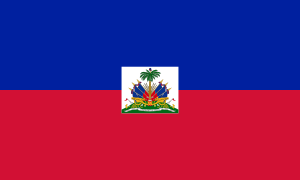Haitian people

|
|
| Total population | |
|---|---|
| c. 13 million | |
| Regions with significant populations | |
|
|
|
|
|
929,074 |
|
|
800,000 |
|
|
300,000 |
|
|
137,995 |
|
|
90,000 |
|
|
80,000 |
|
|
42,500 |
|
|
33,500 |
|
|
30,000 |
|
|
15,000 |
|
|
13,885 |
|
|
8,000 |
|
|
7,600 |
|
|
6,900 |
|
|
4,000 |
|
|
4,000 |
|
|
4,000 |
|
|
~ 5,000 |
|
|
1,760 |
|
|
1,673 |
|
|
1,500-2,000 |
|
|
1,500 |
|
|
1,000 |
|
|
1,000 |
|
|
1,000 |
|
|
1,000 |
|
|
600 |
|
|
594 |
|
|
335 |
|
|
262 |
|
|
52 |
|
|
25 |
| Languages | |
| French and Haitian Creole | |
| Religion | |
| Roman Catholic 80%, Protestant 16%, (Baptist 10%, Pentecostal 4%, Adventist 1%, other 1%), other 3% (Islam,Bahá'í Faith,Judaism) | |
| Related ethnic groups | |
| French, Africans, Latin Americans, Louisiana Creoles, Other Francophone people (particularly French Antillean and French Canadian) | |
Haitians (French: haïtiens, Haitian creole: ayisyen) are the inhabitants and citizens of Haiti. A Haitian can be also a person born abroad to a Haitian parent or a foreigner living in Haiti who acquired Haitian citizenship.
According to the Constitution of Haiti, a Haitian citizen is:
The Haitian Constitution of 2012 re-legalizes dual citizenship, allowing for Haitians living abroad to own land and run for Haitian political office (except for offices of president, prime minister, senator or member of the lower house of Parliament).
Haiti is a majority black country (5% are of mixed African and other racial makeup), however many peoples of different ethnic and national backgrounds have settled and had major influence in the country's 200+ year history such as Poles (Polish legion), Jews,Arabs (from the Arab diaspora), Chinese,Indians,Spanish, Germans (18th century and World War I), Italians, and French, most marrying into the majority black populace and in turn yielding mulattoes (many of whom are prominent in Haitian society).
The official languages of Haiti are French and Haitian Creole.
Traditionally, the two languages served different functions, with Haitian Creole the informal everyday language of all the people, regardless of social class, and French the language of formal situations: schools, newspapers, the law and the courts, and official documents and decrees. However, because the vast majority of Haitians speak only Creole, there have been efforts in recent years to expand its uses. In 1979, a law was passed that permitted Creole to be the language of instruction, and the Constitution of 1983 gave Creole the status of a national language. However, it was only in 1987 that the Constitution granted official status to Creole.
...
Wikipedia
